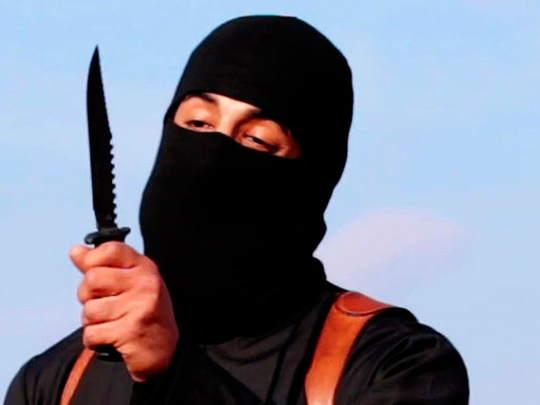
London: Prime Minister David Cameron vowed to defeat militants and defended Britain’s secret services on Friday after media reports named Daesh executioner “Jihadi John” as London graduate Mohammad Emwazi.
“We will do everything we can with the police, the security services, with all that we have at our disposal, to find these people and put them out of action,” Cameron said at a press conference in Wales.
“Jihadi John”, believed to be responsible for beheading at least five Western hostages, was identified on Thursday by media and experts as a Kuwaiti-born computing graduate who had lived in London since the age of six.
As families of the slain hostages were calling for justice, Britain’s domestic spy agency MI5 came under scrutiny following revelations Emwazi had been known to security services for several years.
“I work very closely with our security services, I meet with them regularly, I ask them searching questions about what they do,” Cameron said.
“While we are in the middle of this vast effort to make sure British citizens are safe, the most important thing is to get behind them,” he added.
Campaign group Cage said MI5 had been tracking Emwazi, aged in his mid-20s, since at least 2009.
“MI5 blunders that allowed Jihadi John to slip the net,” read a headline in the Daily Telegraph newspaper, while the Daily Mail asked: “On the MI5 watch list, so how could he escape to Syria?”
“One of the difficulties here is that you can’t keep an eye on everyone all the time,” Menzies Campbell, a member of parliament’s intelligence and security committee, told BBC radio’s Today programme.
But he said lawmakers would look into the questions raised, adding: “There’s no doubt that from time to time the security services have got to prioritise those upon whom they are conducting surveillance”.
Campbell drew a parallel with a case that was investigated by the committee — the killing of British soldier Lee Rigby in a London street in 2013 by two home-grown British Islamist extremists.
Asked if Cameron was concerned about Emwazi’s name being reported, a spokeswoman for his office said: “The prime minister would be concerned about information being put into the public domain at any time that might jeopardise ongoing police or security investigations or the safety of British citizens”.
‘Apology for terror’
London mayor Boris Johnson meanwhile accused Cage of “an apology for terror” for blaming Emwazi’s radicalisation on his alleged detention and “harassment” by the British security services.
Cage, which published years of correspondence with Emwazi, said he had become radicalised on a post-graduation trip to Tanzania in 2009.
“It was incredible that people could stand up and pretend that somehow it was the fault of the security forces,” Johnson said.
“I think that is beyond satire and amounts to nothing less than an apology for terror.”
In the gruesome Daesh execution videos posted online, the masked executioner appears dressed all in black with only his eyes exposed, brandishing a knife while launching tirades against the West.
“Jihadi John”, nicknamed after Beatle John Lennon due to his British accent, is believed to be responsible for the murders of US journalists James Foley and Steven Sotloff, British aid workers David Haines and Alan Henning and American aid worker Abdul Rahman Kassig.
He also appeared in a video with Japanese hostages Haruna Yukawa and Kenji Goto shortly before they were killed.
Families of the Western hostages apparently slain by the masked killer said they hoped that his naming would help bring him to justice.
“My only hope is that the revelation of his identity will lead to his arrest and that he will be judged according to civilised law,” Dragana, the widow of murdered British aid worker David Haines, said from her home in Croatia.
But Haines’s daughter Bethany told British news channel ITV that victims’ families would feel closure only “once there’s a bullet between his eyes”.












